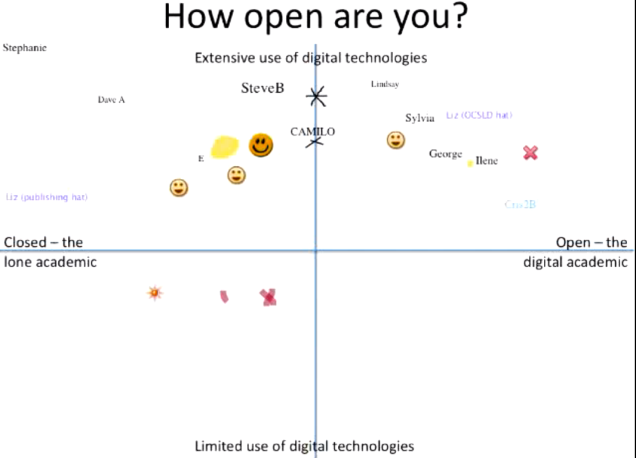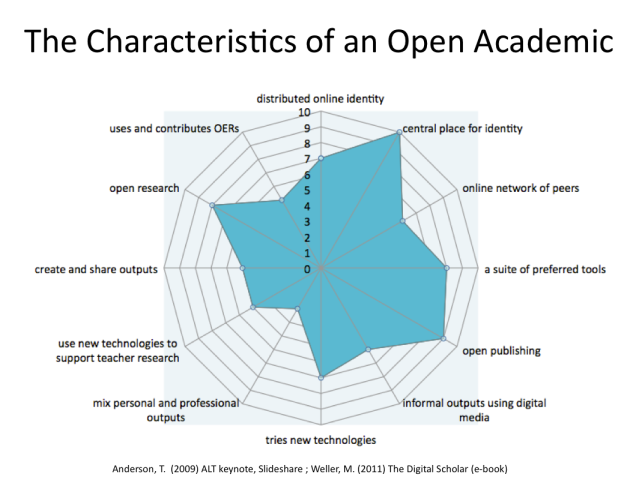This was a question that I asked FSLT13 participants this week in a synchronous online session that I was invited to run. I suggested that we place ourselves on this grid, according to whether we consider ourselves a lone academic or an open scholar and whether we make limited use of digital technologies or extensive use of them. This was the response.

Given that FSLT13 is principally for people new to learning and teaching in Higher Education, but also for anyone who has an interest in learning and teaching in HE, the outcome of this activity is not really surprising. Whilst the majority of people in the session felt they are making good use of digital technologies, not everyone feels they are working as open academics, and as one participant pointed out the notion of ‘openness’ can be context dependent.
The invitation to run this live session was good for me. It forced me to consider how open I am. I decided to try and depict this graphically by using characteristics which have been discussed by Terry Anderson and Martin Weller (see references at the end of this post), scoring myself out of 10 for each characteristic and generating a radar graph. This was the result.

It is fairly obvious from this that there is room for more openness in my academic practice, but that would mean increased contribution of OERs and shared outputs, increasing my online network and mixing personal and professional outputs. To be honest, I am hesitant to do any of these things. I can just about keep up with the online network I have, my outputs would have to be of significantly higher quality for me to feel confident in pushing them out there, and there’s no way I want to share aspects of my personal life with people I don’t know. So that leaves me with being more adventurous with new technologies, which I could/should do, and maybe that would increase my confidence with sharing outputs and thus increase my online network.
Given how many years’ experience I have had of teaching and learning on and offline, it is easy to see how becoming an open academic can be daunting. I have in the past discussed the ‘tyranny’ of openness and the fact that regarding openness as some sort of moral imperative can be unhelpful.
I haven’t changed my views on this, as I don’t think we can force people to be ‘open’. But I do think it is worth reflecting on Terry Anderson’s comments that
‘…successful educators share most thoroughly with the most students’
‘…expertise is non-rivalrous … it can be given without being given away’
In other words openness can be seen as an opportunity rather than a threat.
But ultimately openness is an individual dimension as Carmen Tschofen and I discussed in our paper – Connectivism and Dimensions of Individual experience (see reference below).
These were the ideas (and there were more), that we discussed in the live session, a recording of which has been posted on `YouTube’. I will now try and address my reluctance to share outputs by posting this here – and hope I don’t live to regret it 🙂
It took me a while to relax (I still find it difficult to talk to an invisible audience), but once I got going, I enjoyed it. However, despite all my preparation and determination to be sufficiently organised to be able to follow the chat at the same time as speaking, I still didn’t manage it. So apologies to those whose questions went unanswered.
Finally I was really interested to see this response to aspects of the session from Steffi in her Week 1 reflection
The rewards of open practice come in reciprocity, alternative perspectives and opportunities for dialogue. Thanks to FSLT13 participants and team for this opportunity.
References
Anderson, T. (2009). Association for Learning Technology Conference, keynote presentation. http://www.slideshare.net/terrya/terry-anderson-alt-c-final
Weller, M. (2011). The Digital Scholar. How technology is transforming academic practice http://dx.doi.org/10.5040/9781849666275
Tschofen, C. & Mackness, J. (2011). Connectivism and Dimensions of Individual Experience. International Review of Research in Open and Distance Learning. http://www.irrodl.org/index.php/irrodl/article/view/1143
Jenny, you might want to add Nigel Ecclesfield and my Co-creating Open Scholarship which was inspired, in part by Terry’s keynote (we were both there). It tries to codify what open Scholarship might be, given that Terry was highlighting it’s potential; http://repository.alt.ac.uk/2177/7/RLT_A_007795_O.html
Fred – thanks so much for posting this link. I wish I had been aware of this before my presentation. I haven’t read or, more importantly, reflected on it yet (Saturday evening isn’t conducive to reflective thought!), but I will do. Wish I had been at Terry’s keynote. Lucky you!
Many thanks – Jenny
Hi Jenny,
I have to tell you how much I enjoyed to participate in your session. You seemed very relaxed, the video was fine and the atmosphere was warm. I liked the presentation as well, I thought it was well designed for newbies, too. Not too much information or details.
The trend goes toward more openness in the universities but I have a feeling that it is very limited today. Most so called open guys work outside academic life. For instance me, it is easy to be open when retired, nothing to lose any more. If someone is interested in my blog, it’s all fine.
Expertise is non-rivalrous only partly, there is a long way to new open culture of sharing.
Your diagrams inspire me, I should place myself on the map. And I forgot to thank you for the opportunity to DO something on the whiteboard in the session, it always activates.
Jenny, thanks! I gave a link to the paper on Co-creating Open Scholarship but Sue Beckingham at Sheffield Hallam made a one page summary that people might find easier to absorb, download here; http://www.slideshare.net/fredgarnett/summary-of-cocreating-open-scholarship
Hi Jenny,
Your session was very good and I enjoyed it a lot! Thank you so much for sharing, especially since it is an odd feeling when you are the only one talking in a voice/video chat and the whole room seems quiet apart from text chat. 🙂
And also thanks for linking my blog and commenting on it, too.
To quote your blog post here:
“To be honest, I am hesitant to do any of these things. I can just about keep up with the online network I have, my outputs would have to be of significantly higher quality for me to feel confident in pushing them out there, and there’s no way I want to share aspects of my personal life with people I don’t know.”
That’s exactly the point where my initial worries come from, but when I read your blog or see how you actively take part in this MOOC I feel like you are already out there. And knowing that others share the same worries I have, makes me a little bit more confident myself.
After all, open access and these things are still fairly new and I suppose it is only natural to feel a little unprepared. But just by reading what the others on the course say, I feel like I have learned something. There is still the next big step of becoming more involved and outspoken… like Rudy, Heli or Marion and, of course, the others who seemingly participate with ease.
Cheers,
Steffi
Heli, Fred and Steffi – thanks for your comments and visit to my blog.
Fred – thanks for the new link – very helpful. I’m looking forward to digging into all this a bit deeper.
Heli – Thanks so much for your kind words. I agree that it is easier to be open once your career is established or after we have retired, i.e. when we have nothing to lose. It is interesting to speculate how what proportion of the academic population is ‘open’ in terms of the characteristics we were discussing in the webinar. I suspect it’s rather context dependent, but it would be interesting to know more.
Steffi – Thank you too for your kind words. Yes, for me it does feel odd and strangely nerve-wracking to talk to ‘silent’ room, especially when I am hopeless at following chat at the same time as talking. I suspect it becomes easier with practise, but I don’t do this enough to get ‘practised’. Certainly blogging openly becomes easier with time – and from my own experience, I just keep adding a little bit at a time – so for example, I blogged for a long time before I opened a Twitter account. This is not only to do with increasing openness, but also learning just how much I can cope with technically and in terms of managing my time.
Thanks all for your comment
Hi Jenny! Sheila McNeill and I are facilitating a webinar today, as part of Open Education Week. We were looking for a way to invite participants’ perceptions of themselves as open learners/educators, and we’ve decided to use your grid from this post. We plan to use it as a brief reflective exercise, but also as a conversation starter. If you have any other advice or thoughts on this, please let us know. Thank you for being such an open learner and educator — I have learned a great deal from your sharing your learning, and our occasional interactions 🙂
The details of our webinar are here: http://rustleblog.wordpress.com/open-education-week-2014/ and our slides are here: http://www.slideshare.net/cicronin/open-and-online-connections-community-and-reality-32307011
Thanks again.
Hi Catherine and Sheila. Thanks for letting me know about your webinar and posting your slides. I’m not sure I’ll be able to make it, but if not I’ll try and catch the recording. Hope there will be a recording.
I don’t think I have any thoughts to add to this, that are not already in the blog post or the webinar recording that I did. My current thinking about openness is being influenced by Deleuze and Guattari’s writings about smooth and striated space, which also fits with our work on emergent learning – but I am still thinking that through, so nothing concrete to say at the moment. I very much like the idea of thinking about ‘open’ as a space that learners can move into – that’s as far as I’ve got at the moment.
All the best for your webinar.
Jenny
Thank you so much, Jenny — we’ll be in touch again after the webinar (there will be a recording). Your comment about “still thinking that through” resonates with me. I have been using the verb “becoming” re: open education lately. It feels to me to be a process of becoming — challenging but so rewarding. Talk soon 🙂